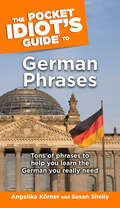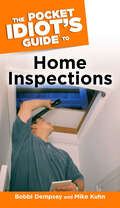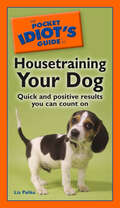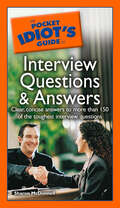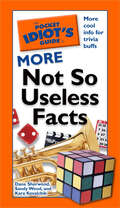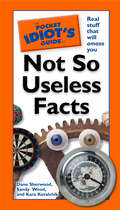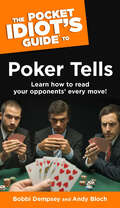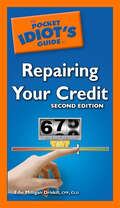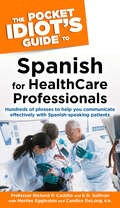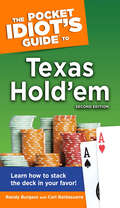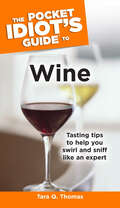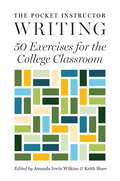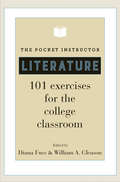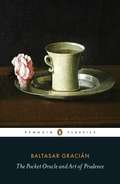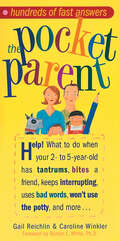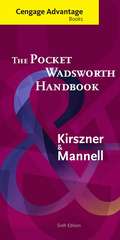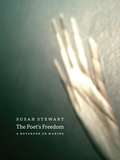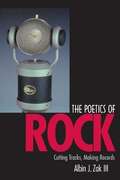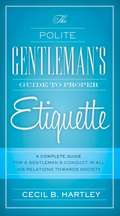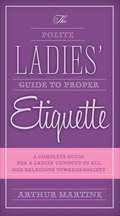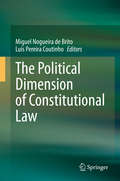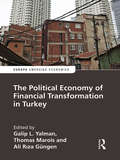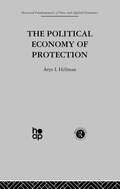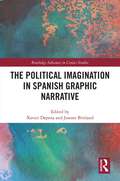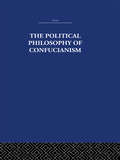- Table View
- List View
The Pocket Idiot's Guide to German Phrases: Tons of Phrases to Help You Learn the German You Really Need
by Susan Shelly Angelika KornerSprechen Sie Deutsch? You do now! The Pocket Idiot&’s Guide® to German Phrases is a handy, informative, and fun guide to all the phrases readers need to enjoy a visit to Germany, complete with the basics of German grammar and syntax and a compact German-English/English-German dictionary. • Nearly 1.7 million Americans travel to Germany each year for business and/or leisure—and most will find this book invaluable. • Full of current and classic phrases from every aspect of life and travel, along with useful travel tips and maps. • Easy-to-use pronunciation guide and verb, noun, and idiom charts. • Convenient, pocket-size format for on-the-go travelers.
The Pocket Idiot's Guide to Home Inspections
by Bobbi Dempsey Mike KuhnFor home buyers and home sellers. Here is the first how-to that addresses the needs of both buyers and sellers, making it the perfect companion to the bestselling The Complete Idiot&’s Guide® to Buying and Selling a Home. The buyer will depend on this guide to determine whether a house is worth buying. The seller will need it to determine which repairs are necessary before listing or signing anything. Readers will learn to troubleshoot all areas of a home, including its structure and foundation, windows and doors, plumbing, heating and air conditioning, insulation, electrical systems, and the roof, just to name a few. In this Pocket Idiot&’s Guide®, you get: • What to look for when inspecting the electrical system, the roof, and other parts of the home. • Simple advice on what to do if the results of your inspections aren&’t good. • Expert explanation of what you can expect during and after the inspection. • Easy ways to tell if a home is worth buying—or if it will need extensive repairs before you put it on the market.
The Pocket Idiot's Guide to Housetraining Your Dog: Quick and Positive Results You Can Count On
by Liz PalikaEvery dog has its training day. You&’re no idiot, of course. You know that housetraining a dog can be just as difficult—and possibly as traumatic—as potty training a child. But with an established routine and positive reinforcement, your dog can be happily and healthily trained in no time.The Pocket Idiot&’s Guide® to Housetraining Your Dog will show you exactly how to teach your dog this essential trick. In this Pocket Idiot&’s Guide®, you get: • Housetraining schedules for owners with busy lifestyles. • Tips on how to get the quickest results. • Training techniques for indoor-only dogs, dogs with yards, city dogs . . . even shelter dogs. • Advice on how to cope with health issues that may impede a dog&’s progress.
The Pocket Idiot's Guide to Interview Questions And Answers
by Sharon McDonnell&“When can you start?&” Giving compelling answers to interview questions can make the difference between winning a job and unemployment. The Pocket Idiot&’s Guide® to Interview Questions and Answers will arm you with answers to the 150 toughest interview questions. Whether you read the book cover-to-cover to prepare for an initial interview or uses it as a last-minute reference on the way to a final interview, you will be prepared to offer clear, concise, and thoughtful answers. You&’ll also learn what questions to ask your interviewer to help you figure out if the job is right for you. • Pocket size gives you easy-to-access information to prepare for an interview. • Helps you understand what information interviewers are really trying to uncover with their questions.
The Pocket Idiot's Guide to More Not So Useless Facts
by Sandy Wood Dana SherwoodPeople love weird facts. And judging from the success of the original Pocket Idiot&’s Guide® to Not So Useless Facts, readers love the collection of wacky and interesting facts and factoids. Now, back by popular demand, is The Pocket Idiot&’s Guide® to More Not So Useless Facts, with completely new entertaining and insightful facts. Gathered by an expert team of fact finders and pop culture specialists, this collection includes only facts that are interesting and could be useful to students, collectors, tourists, and enthusiasts alike.
The Pocket Idiot's Guide to Not So Useless Facts
by Sandy Wood Dana SherwoodPeople love weird facts. And this gift hardcover is bursting with 208 pages of all sorts of amazing, arcane, interesting, and shocking bits of information about everything under the sun—and then some. Put together by an expert team of fact finders and pop culture specialists, this collection includes fascinating facts that could be useful to students, collectors, tourists, and enthusiasts alike. • Nearly 1,000 amazing, not-so-useless facts
The Pocket Idiot's Guide to Poker Tells: Learn How to Read Your Opponents’ Every Move!
by Bobbi Dempsey Andy BlochRead your opponent . . . and rake in the chips. The world&’s best poker players can read their opponents&’ most subtle expressions and behaviors—no matter how hard their opponents try to hide them. A tapping foot, a change in vocal tone, and countless other clues &“tell&” an informed player what cards the opponent is holding and how they&’re likely to be played. The Pocket Idiot&’s Guide® to Poker Tells explains everything amateur poker players need to start interpreting tells and using them to develop poker intuition. In this Pocket Idiot&’s Guide®, you get: • Foolproof tips to help you recognize all kinds of tells. • Game-saving advice on avoiding tells yourself—and recognizing fake ones. • Surefire strategies for dealing with the five different types of player personalities. • Idiot-proof techniques for sharpening your tell-spotting skills.
The Pocket Idiot's Guide to Repairing Your Credit, 2nd Edition
by Edie Milligan DriskillGood news for hard economic times . . . During this recession, even people once considered prime customers have watched their credit ratings decline. This guide shows these readers how to reestablish their credit and increase their credit scores. Topics include: the ins and outs of credit scores; where to get credit reports and how to identify mistakes; how to take advantage of consumer protection laws; telephone scripts and a letter to use when communicating with creditors and bureaus. • In 2008, over two million Americans lost jobs-and one out of every 10 mortgages were one month or more behind in payments • Author is a sought-after expert on personal financial planning, featured in Money Magazine, Family Circle, Women's Day, and on CNBC and CNN
The Pocket Idiot's Guide to Spanish For Health Care Professionals
by K.D. Sullivan Prof. Richard P. CastilloFor health workers serving a growing community. Today, when one in four babies born in the US is Hispanic, it is essential that every hospital administrator, nurse, EMT, and doctor have a working knowledge of Spanish. Chapters include vocabulary, phrases, and pronunciation for everything from insurance forms to mental health to prenatal care, with additional sections on dentistry and optometry. • Essential reference for doctors, nurses, EMTs, nursing home staff, home caregivers, volunteers, hospice nurses, and administrators. • Perfect size for a lab coat pocket. • Author is an experienced linguist with experience in teaching health care–related Spanish courses.
The Pocket Idiot's Guide to Texas Hold'em, 2nd Edition: Learn How to Stack the Deck in Your Favor!
by Carl Baldassarre Randy BurgessThe how-to-win guide for the blue chip of poker games. Texas Hold'em, the game featured on the popular television programs and dealt at well-known tournaments, has quickly become the one to play-and the one to win. In the context of teaching readers the basics of Texas Hold'em, this revised edition covers "No Limit" strategies and tournaments, and the basics for winning bigger cash pots. Although the dynamics for this version of the game are similar to its low-limit cousin, "No Limit" strategy is quite different. This revised book covers no-limit in much greater detail, as it relates to cash games, online games, and tournaments.
The Pocket Idiot's Guide to Wine: Tasting Tips to Help You Swirl and Sniff Like an Expert
by Tara Q. ThomasEverything you need to know about wine—to go. With separate chapters for the best whites and reds and special advice on bubbly wines, dessert wines, and more, Tara Q. Thomas provides a perfect quick reference book for pocket or purse. Most importantly, Thomas brings her fresh, approachable tone to this book, making beginners feel welcome with straight, unsnobbish talk about wine—including the basics of labels, how to taste, recommended wines, bargains, price ranges, and more for chardonnay, sauvignon blanc, Riesling, pinot grigio, cabernet sauvignon, merlot, pinot noir, and Syrah.
The Pocket Instructor: 50 Exercises for the College Classroom (Skills for Scholars #6)
by Amanda Irwin Wilkins and Keith ShawFifty easy-to-deploy active learning exercises for teaching academic writing in any fieldThe Pocket Instructor: Writing offers fifty practical exercises for teaching students the core elements of successful academic writing. The exercises—created by faculty from a broad range of disciplines and institutions—are organized along the arc of a writing project, from brainstorming and asking analytical questions to drafting, revising, and sharing work with audiences outside traditional academia. They present students with engaging intellectual challenges to work through together, arriving at generalizable lessons that transfer well across the humanities, social sciences, and natural sciences.Students will learn to articulate a thoughtful question, develop a persuasive thesis, analyze complex evidence, and engage responsibly with sources. The Pocket Instructor: Writing offers teachers concrete ideas about how to cultivate habits of radical revision and create a classroom community with an ethos of trust where students learn to give meaningful feedback. Written for both novice and veteran instructors, this essential guide will benefit faculty in any field who hope to improve student writing in their courses.Key features:• Exercises by experienced faculty from a wide range of disciplines and institutions• Step-by-step instructions with instructor insights for each exercise• A &“Writing Lexicon&” for terms such as motive, thesis, analysis, evidence, and method• Guidance for avoiding plagiarism• Index and cross-references to aid in course planning
The Pocket Instructor: Literature
by Diana Fuss William A. GleasonThis is the first comprehensive collection of hands-on, active learning exercises for the college literature classroom, offering ideas and inspiration for new and veteran teachers alike. These 101 surefire lesson plans present creative and interactive activities to get all your students talking and learning, from the first class to final review. Whether you are teaching majors or nonmajors, genres or periods, canonical or noncanonical literature, medieval verse or the graphic novel, this volume provides practical and flexible exercises for creating memorable learning experiences. Help students learn more and retain that knowledge longer by teaching them how to question, debate, annotate, imitate, write, draw, map, stage, or perform. These user-friendly exercises feature clear and concise step-by-step instructions, and each exercise is followed by helpful teaching tips and descriptions of the exercise in action. All encourage collaborative learning and many are adaptable to different class sizes or course levels. A collection of successful approaches for teaching fiction, poetry, and drama and their historical, cultural, and literary contexts, this indispensable book showcases the tried and true alongside the fresh and innovative.101 creative classroom exercises for teaching literatureExercises contributed by experienced teachers at a wide range of colleges and universitiesStep-by-step instructions and teaching tips for each exerciseExtensive introduction on the benefits of bringing active learning to the literature classroomCross-references for finding further exercises and to aid course planningIndex of literary authors, works, and related topics
The Pocket Oracle and Art of Prudence
by Baltasar GraciánWritten over 350 years ago, The Pocket Oracle and the Art of Prudence is a charming collection of 300 witty and thought-provoking aphorisms. From the art of being lucky to the healthy use of caution, these elegant maxims were created as a guide to life, with further suggestions given on cultivating good taste, knowing how to refuse, the foolishness of complaining and the wisdom of controlling one's passions. Baltasar Gracian intended that these ingenious aphorisms would encourage each reader to challenge themselves both in understanding and applying each axiom.
The Pocket Parent
by Gail Reichlin Caroline WinklerIt's instant relief for when your 2-year-old is on the floor of the toy store, pitching a fit. Or when brother and sister discover that they can't stand each other. Or when your son can't say no to video games.The Pocket Parent is, literally, a pocket-size book of tried-and-true advice, common sense, parental wisdom, and sanity. Written by two professionals who've reared six children between them and made a career out of helping others with parenting issues, this handy book will be a lifesaver for every parent of a 2-to-5-year-old. It begins with an overall view of the Pocket Parent approach to discipline. Based on unconditional love but firm limits, and aimed at keeping the child's dignity and self-esteem intact, here are strategies that include "I" statements, modeling, family meetings, and "one word" requests. Once the ground rules are set, the guide moves to an A-to-Z compendium of common problems. Just look it up-Anger, Bad Words, Biting, Chores, Doctor Visits, Fears at Night, Lying, Separation Anxiety-and find the "Sanity Savers" list of suggestions, easy-to-follow bullets, anecdotes, and more.For the bag, glove compartment, backpack, or shelf in the kitchen, it's there for you whenever you need it.
The Pocket Wadsworth Handbook (Sixth Edition)
by Laurie G. Kirszner Stephen R. MandellThis sixth edition of THE POCKET WADSWORTH HANDBOOK provides up-to-date, realistic advice for today's digital-age students. You will find it clearly written, thorough, easy to navigate, and indispensable for use in college courses and beyond.
The Poet's Freedom: A Notebook on Making
by Susan StewartWhy do we need new art? How free is the artist in making? And why is the artist, and particularly the poet, a figure of freedom in Western culture? The MacArthur Award–winning poet and critic Susan Stewart ponders these questions in The Poet’s Freedom. Through a series of evocative essays, she not only argues that freedom is necessary to making and is itself something made, but also shows how artists give rules to their practices and model a self-determination that might serve in other spheres of work.Stewart traces the ideas of freedom and making through insightful readings of an array of Western philosophers and poets—Plato, Homer, Marx, Heidegger, Arendt, Dante, and Coleridge are among her key sources. She begins by considering the theme of making in the Hebrew Scriptures, examining their accountof a god who creates the world and leaves humans free to rearrange and reform the materials of nature. She goes on to follow the force of moods, sounds, rhythms, images, metrical rules, rhetorical traditions, the traps of the passions, and the nature of language in the cycle of making and remaking. Throughout the book she weaves the insight that the freedom to reverse any act of artistic making is as essential as the freedom to create. A book about the pleasures of making and thinking as means of life, The Poet’s Freedom explores and celebrates the freedom of artists who, working under finite conditions, make considered choices and shape surprising consequences. This engaging and beautifully written notebook on making will attract anyone interested in the creation of art and literature.
The Poetics of Rock: Cutting Tracks, Making Records
by Albin J. Zak IIIA fascinating exploration of recording consciousness and compositional process. It examines the crucial roles played by recording technologies in the construction of rock music and shows how songwriters, musicians, engineers, and producers contribute to the creative project.
The Polite Gentlemen's Guide to Proper Etiquette: A Complete Guide for a Gentleman's Conduct in All His Relations Towards Society
by Cecil B. HartleyFrom advice on how to treat ladies to how to behave at a party this handy 19th-century guidebook will delight readers with it's entertaining nuggets of wisdom. Ever wondered what to do in polite society if you find an insect in your food? Or how a gentleman should ask a lady to dance? And what on earth is the etiquette for smoking cigars? First published in 1860, this classic guide to gentlemanly behavior is a veritable mine of information and indispensable advice for aspiring gentlemen. No matter if a man finds himself at home, in the street, or in a place of amusement, he has but to leaf through this book to learn how best to behave, and indeed how not to behave. And if he can find time between his numerous invitations to balls and hunting parties, he could benefit from a perusal of the sections on gentlemanly deportment and conversational technique. Not forgetting, of course, the all-important advice on how to treat ladies, surely an integral part of any true gentleman's training.
The Polite Ladies' Guide to Proper Etiquette: A Complete Guide for a Lady?s Conduct in All Her Relations Towards Society
by Arthur MartineA complete manual for those who desire to understand the rules of good breeding, the customs of good society, and to avoid incorrect and vulgar habits. Such as: Clear and Comprehensive Directions for Correct Manners, Dress, and Conversation; Instructions for Good Behavior at Dinner Parties, and the Table, with Hints on the Art of Carving and Taking Wine at Table Together with the Etiquette of the Ball and Assembly Room, Evening Parties Deportment in the Street and when Traveling And the Usages to be Observed when Visiting or Receiving Calls In addition to this readers will also master the etiquette of courtship, marriage, domestic duties, and fifty-six rules to be observed in general society.
The Political Dimension of Constitutional Law
by Luís Pereira Coutinho Miguel Nogueira de BritoThis book discusses in what sense constitutional law has a political dimension, raising the question whether constitutional law is fundamentally political as to its validity, terms of its origin, conceptual structure and/or corresponding practice. It also poses the question whether that dimension is a political-theological dimension. A positive answer to these questions challenges the prevailing view that constitutional law is to be conceived strictly as law, moreover as written law, approved at a certain point in history by a particular power and interpreted as any other law by the judiciary. The essays included in this book, written by leading scholars in constitutional theory – including Martin Loughlin, Paul Kahn, Manon Altwegg-Boussac and Massimo La Torre – address these questions in a timely and original way.
The Political Economy of Financial Transformation in Turkey (Europa Perspectives: Emerging Economies)
by Galip Yalman Thomas Marois Ali Rıza GüngenThis volume provides a comprehensive study of Turkey’s financial transformation into one of the most dynamic, if not trouble-free, emerging capitalisms. While this financial evolution has underwritten Turkey’s dramatic economic growth, it has done so without ameliorating the persistently exploitative and unequal social structures that characterize neoliberalism today. This edited volume, written by an interdisciplinary range of political economists, critically examines Turkey’s financial transformation, contributing to debates on the nature of peripheral financialization. Eschewing economistic interpretations, The Political Economy of Financial Transformation in Turkey underscores both the quantitative significance of exponential growth in financial flows and investments, and the qualitative importance of the state’s institutional restructuring around financial imperatives. The book presents today’s reality as historically rooted. By understanding the choices made under the new Republic (from 1923 onwards), one can better locate the changes launched as a newly liberalizing society (since 1980). Likewise, the decisions made in response to Turkey’s 2001 financial crisis spurred a tectonic break in state–market–society financial relations. The waves of change have reached far and wide: from corporate strategies of accumulation and growth to small- and medium-sized enterprises’ strategies of financial survival; from how finance has penetrated the provisioning of housing to how households have become financialized. Put together, one grasps the complexity and historicity of the power of contemporary finance. One also sees that the changes made have not been class-neutral, but have entailed elevating the interests of major capital groups, particularly financial capital, above the interests of the poor and workers in Turkey. Nor are these changes constrained to its national borders, as what transpires domestically contributes to the making of a financialized world market. Through this ‘Made in Turkey’ approach the contributions in this volume thus challenge dominant understandings of financialization, which are derived from the advanced capitalisms, by sharing the specificity of emerging capitalisms such as Turkey.
The Political Economy of Protection (Harwood Fundamentals Of Pure And Applied Economics Ser.)
by Arye L. HillmanFirst Published in 2001. Routledge is an imprint of Taylor & Francis, an informa company.
The Political Imagination in Spanish Graphic Narrative (Routledge Advances in Comics Studies)
by Xavier Dapena Joanne BritlandIn a spirit of community and collective action, this volume offers insights into the complexity of the political imagination and its cultural scope within Spanish graphic narrative through the lens of global political and social movements. Developed during the critical years of the COVID-19 pandemic and global lockdown, the volume and its chapters reflect the interdisciplinary nature of the comic. They employ a cultural studies approach with different theoretical frameworks ranging from debates within comics studies, film and media theory, postcolonialism, feminism, economics, multimodality, aging, aesthetics, memory studies, food studies, and sound studies, among others. Scholars and students working in these areas will find the book to be an insightful and impactful resource.
The Political Philosophy of Confucianism: An interpretation of the social and political ideas of Confucius, his forerunners, and his early disciples.
by Leonard Shihlien HsüFirst published in 1932.One of the most astonishing features of the Confucian teaching to the modern reader is its anticipation of the Spencerian formula of evolution and its adaptation of this to a programme of progress. This volume shows that Confucius' teaching is still relevant in many of its features, not merely for China but also for the West. Contents include: The background of Confucian political philosophy; the state and its origin; political unity and organization; the principle of benevolent government; law and justice; democracy and representation, social evolution.
